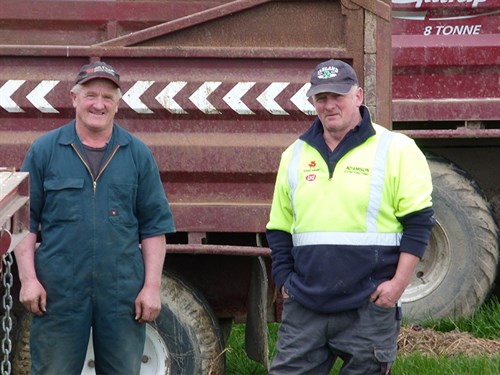Profile: Giltrap trailers
Farm Trader visits Southland farmers Johnny and Linton Adamson, who operate separate farms in Waianiwa and own eight Giltrap trailers
A quick chat with Johnny and Linton and you get the impression that it’s quality and not just quantity that’s king in the brothers’ farming operations.

While they each run their own farm, they happily share much of their collective farm machinery along with other resources.
On a recent visit south, I caught up with Johnny and Linton, as well as Linton Jr and
the patriarch, 93-year-old Jock, who is still capable of putting in a good day’s work at
Ros Mhor Farm. The farm is named after Jock’s hometown in Scotland.
When I asked Johnny how many cows he milked on his 300-acre farm, I expected the answer to be somewhere in the region of 300 to 400, and I have to admit to being somewhat surprised when the answer I got was 140.
Sensing my surprise at the relatively small number of cows in the herd, Johnny was quick to rattle-off some numbers about the weight of milk solids each cow produces; to be more specific, 616kg per annum against a national average of around 370kg.

In fact, in a subsequent chat with Johnny, he told me he’d just received confirmation
that one of his herd was the top protein-producing cow, as recognised by the Holstein Friesian Association.
When I asked him the secret of his success in getting such a high yield, he said while it’s important to have good genetics, it’s also a crucial part of his operation to make sure his cattle are fed on good-quality fodder.
Knowing that I’d come to his farm for a look at the extensive co-owned (with Linton) fleet of Giltrap trailers, he semi-jokingly said that in order to have well-fed stock, a farmer needs to have plenty of trailers.
In my world of restoring machinery, there’s a well-worn adage that ‘a man can’t have too many grinders’, and I guessed that the same kind of philosophy could be applied in the life of a farmer.
The Giltrap trailer fleet

Johnny and his brother have eight trailers between them (Johnny owns five and Linton owns three) and every single one is a Giltrap trailer.
The first Giltrap trailer arrived on the farm back in 1979 when his dad, Jock, purchased a new five-tonne unit. The best bit is that this original ‘old reliable’ trailer is still in the fleet, and I was able to check it out on the day of my visit. It still looks as good as I would imagine it would have looked on the day it first entered service at Ros Mhor.
Johnny added an axle to the trailer a few years ago to give it some extra carrying capacity, but other than that, he says it’s needed only general servicing in the ensuing 38 years of hard work.
The Adamson family has an ethos of finding a brand of equipment that suits their needs along with providing a back-up service that meets their high standard and sticking with that one brand.
Johnny says that right from the day of the purchase of the first Giltrap unit back in 1979 to the present day (the last trailer purchased was a 17-tonne model in 2015), the service his farming operation has received from Giltrap Engineering has been impeccable.
Giltrap trailer features

When asked what it was that he particularly liked about Giltrap tip trailers, the answer
was threefold.
"They’re exceptionally strongly-built, they have a high tipping angle, and good ground clearance," Johnny says.
He adds that he’s never traded-in a trailer and that as larger models have been required to keep up with the workload, he’s simply put the old unit onto lighter, less frequent work.
He explained that the reason for needing to upgrade to trailers with a greater carrying capacity is that in days gone by, it took 10 bucket-loads to fill a five-tonne trailer, whereas today’s tractors have the capacity to load a five-tonner with only three bucket-loads.
He says the process of harvesting silage has also been sped up over the years, citing the case of it taking a day to harvest a mere five acres in the 1970s, whereas with today’s machinery, seventeen acres per hour is more the norm. "Everything’s got bigger and faster," Johnny says.
Aside from the exceptional back-up service he’s received over the decades from Giltrap Engineering, the thing Johnny likes best about his Giltrap trailers is that they’re strongly built.
In fact, one trailer he purchased 17 years ago has only required its wheel bearings to be tightened, and he adds that it isn’t because it’s had an easy life.
Putting it to use

Along with carting hay bales and silage, the trailers are often used to carry soil, gravel, and straw, often for relatively long distances.
Jonny reckons that part of the farming operation’s success is because he and his brother do as much of the work possible themselves, only calling in contractors
when it’s absolutely necessary.
So when they needed to transport around 560 bales of straw from Drummond, about 18km away, they hooked up some of their fleet of Giltrap trailers to their fleet of
Massey Ferguson tractors and carried out the operation themselves, saving a considerable amount of money in the process.
The Giltrap brand not only features in Johnny’s trailer fleet but there’s also a Giltrap slurry tanker, a feed wagon, and a bale feeder in the mix, with a distinct possibility of a new 17-tonne trailer being constructed by using the axle assembly from the slurry tanker when it receives a bigger set of wheels and tyres.
While it sounds like a bit of a complicated process, I’m sure the teams at Ros Mhor Farm and Giltrap Engineering will do what they’ve always done and make precisely the right bit of kit to suit the purpose.
About Giltrap Engineering
Giltrap Engineering has been in business since 1959 and manufactures tip trailers, silage wagons, bale feeders, fertiliser and slurry spreaders, along with a host of other attachments, such as wood splitters and quick hitches, all of which are manufactured at the Giltrap site in Waikato.
Read more features and profiles from Farm Trader
Keep up to date in the industry by signing up to Farm Trader's free newsletter or liking us on Facebook






.jpg)





